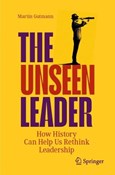- Leadership
Leadership Shaped by Moments in History
Martin Gutmann reveals the unseen qualities that great leaders deploy to master their moment in history
In his new book, The Unseen Leader: How History Can Help Us Rethink Leadership, Gutmann debunks the myth that great leaders must be built in the charismatic, heroic, Hollywood mold. Through an in-depth analysis of the challenging historical environments these four truly great leaders encountered he shows how the best leaders are those who manage to navigate complex situations, de-escalate conflict, communicate with clarity, and subtly guide their followers.

Gutmann, a professor at the Lucerne School of Business, makes the central observation that great leaders succeed by mastering their “moment in history” with astuteness and skill, rather than—as myth would have it—by steering history through sheer force of personality. A view which contradicts the way these leaders have often been portrayed—a false portrayal that can distort our understanding of leadership in general.
Churchill is a vivid example. At a time when Europe was mesmerized by hugely egotistical, charismatic leaders, hooked on unfettered power, he offered something very different—something that has been obscured by the popular depiction of Churchill as a heroic, action-oriented, statesman. In fact his real strength as a wartime leader, based on his personal experience of war and a deep understanding of history, was his ability to read the complex situation the Allies were in, think long-term strategy while mastering detail, motivate others, and act in alignment with historical forces. His was a leadership style directly opposite to the egotistic, hubristic style of his opponents.
By outlining the essence of Churchill’s wartime story, focusing on his actual responses to events, Gutmann exposes the gap between the cold reality and the myth that has arisen. Similarly, with Toussaint Louverture, Gertrude Bell, and Roald Amundsen he shows how myth has concealed a perhaps more mundane truth, but a truth that holds real applicable lessons for today’s current and would-be leaders.
With Bell especially, a woman travelling often as the sole European in a hostile male-dominated Arab world, it is hard not to see her as a heroic super-woman. Yet it is the details of her life, her deep learning and expertise, that reveal her true value as a leadership role-model. As a fellow mountaineer describes (she climbed several mountains, including Mont Blanc and the Matterhorn) there were “few to surpass her in technical skill and none to equal her in coolness, bravery and judgment.” The importance of learning, skill, and judgement are key factors rarely mentioned when the myth is related.
All of this is good news. Great leaders are not exceptionally charismatic super-humans, born with an innate disposition to lead. They are people, albeit with a boundless sense of purpose, who have learnt and developed specific capabilities that, when faced with a particular challenging moment in history, are able to apply their skill and knowledge to successful effect.
As an introduction to the history alone—with each leader’s journey occupying a full chapter—this is an engaging read. As a guide to better leadership its underlying message is original and profound. It tells us that leadership skills can be acquired and honed and that success is far more dependent on adapting to context than on any inherent heroic predisposition.
……………………………………………………………………………………………………………
ARTICLES YOU MIGHT LIKE
RESEARCH
A recent study examines shared leadership configurations and their effectiveness in teams
DEVELOPING LEADERS QUARTERLY MAGAZINE AND WEEKLY BRIEFING EMAILS

































